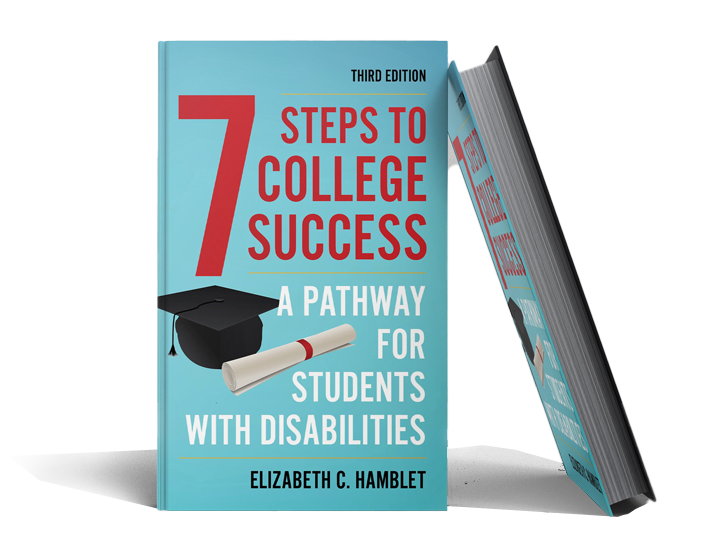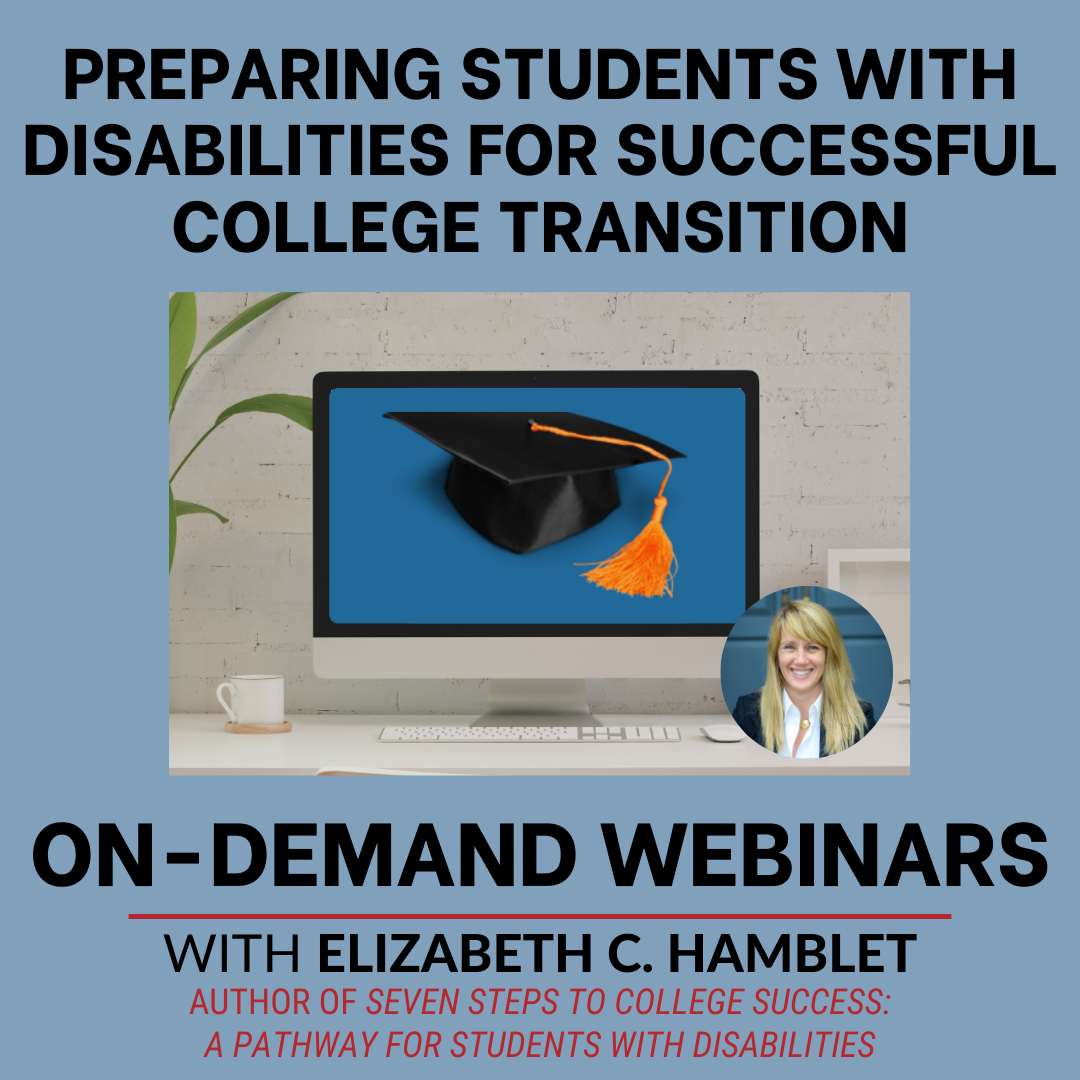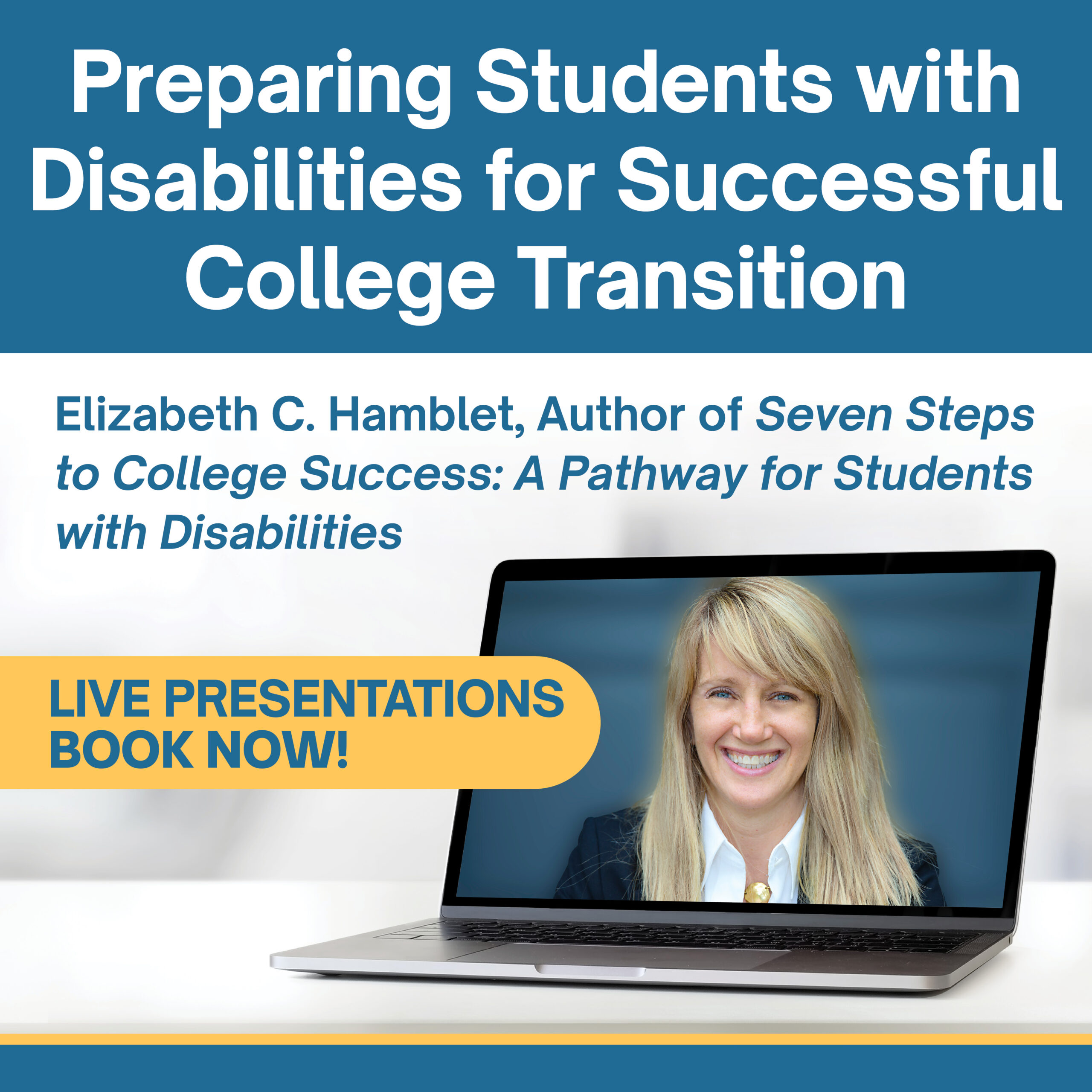Introduction
After they are admitted to and enroll at a college, students with disabilities can request accommodations at college by registering with the disability services office. As part of this process, they’ll likely have to submit documentation of their disability. If you want to learn more about the process, read this post or watch this video.
Students don’t have to say anything about their disability while they are applying to college, but they can do so if they wish. Read Step 6 of my book, Seven Steps to College Success: A Pathway for Students with Disabilities, for more on this.
You’ve doubtless heard from others that your student must have testing done within the last three years, that they must have a neuropsychological evaluation, etc. The most important thing to know is that each college gets to set its own requirements, so the only way to know what documentation a student needs is to check the requirements for that particular college. [Read more about other things you’ve heard that are myths, and what the correct answers are.]
How students can check disability documentation guidelines for colleges
On some schools’ sites, this search will bring up a link to the disability services (DS) office, but some schools don’t use the word “disability” in their name, so the names that come up in the search results may not seem to be the right ones. Here are some of the words that may be included in the name of the correct office:
| Equity | Academic Support |
| Access or Accessibility | Learning Disabilities |
| Diversity | Special Programs |
| Learning Center | Learning Resource Center |
| Learning Support | Academic Success Center |
Once they get to the right page, students should be able to find links that say “documentation guidelines,” or “documentation requirements.” Some schools will have the same requirements regardless of the disability type, while others will have different requirements for different kinds of disabilities, such as learning disabilities or medical disabilities.
What students should pay attention to in documentation requirements
What testing is required
Contrary to what families may hear, requirements can range widely. Some colleges will accept a copy of students’ IEP or 504 plan all by itself; others will not. (And some colleges may not require any documentation at all, though there’s no data available indicating at how many schools this is true.)
At some colleges, testing is only required when students have a learning disability, but others may require it for students with ADHD, and some may require it for students with any kind of disability who are requesting academic accommodations. When testing is required, many colleges requirements will say it should include:
A) a measure of cognitive functioning. Examples include the Wechsler Adult Intelligence Scale- Fourth Edition, or WAIS-IV), Wechsler Intelligence Scale for Children – Fifth Edition, or WISC-V, and the Woodcock-Johnson Tests of Cognitive Ability – IV, or WJ-IV Cognitive.
B) a measure of academic functioning that covers, math, reading, and writing. Examples include the Wechsler Individual Achievement Test – Fourth Edition, or WIAT-4, and the Woodcock-Johnson Tests of Achievement – Fourth Edition, or WJ-IV Achievements.
C) Measures of information processing (this is covered by what appears under A)
Again, what each student’s college requires may be different. Students must check online to see what they need; they should not listen to what others (friends, family) tell them.
Age of documentation
When colleges require students with learning disabilities to provide documentation in the form of testing, the age of that testing will vary different from school to school. While you may have heard that testing can’t be more than three years old, that is not widely true, though it may be the case at some schools. (Learn more by reading this post or watching this video.)
Asking questions to get clarification about documentation requirements
If families are not sure if the documentation the student currently has contains what is required, the student should call the disability services office at the school the student will attend. If the person who answers the phone does not know how to answer their questions (it may be a student worker), the student should ask to speak to the director or anyone who can tell them whether the documentation the student has meets the requirements.
The student should read the list of tests contained in their documentation to the person they speak to and ask that person to confirm that what they have meets the requirements or tell them what’s missing. (It’s a good idea to make a list of the tests included in their documentation before placing this call). The student can make it clear that they don’t expect the person they speak with to approve accommodations over the phone, but rather to confirm that the tests in the documentation cover the requirements.
Parents/guardians can take a “coaching” role by going over everything with their student ahead of time (offering some wording to use, if the student is anxious), and by staying nearby when they call, in case they get asked a question they can’t answer. But this is a perfect time and opportunity for students to develop or practice their self-advocacy skills (which will be so important at college), so rather than making the call themselves, I recommend parents not make the call themselves.
What students should do if their documentation doesn’t meet the college’s requirements
Most students’ documentation will be accepted by their college. Even if it doesn’t seem to meet the requirements, students should submit it anyway; the college may show flexibility. If the college does not accept the documentation, students should ask for temporary accommodations until they can get the testing done and get a report.
If they do need to get testing, students should ask whether the college offers it; most don’t, but a few do. If the college doesn’t do testing, students should ask if the disability services office has a referral list.
Before you hire anyone to do the needed testing, read my tips on what to should look for in a private report and learn how to check that they’ll get a good (not just long) report. For additional resources, they can read about ways to get testing at a reduced cost, and how to try to get insurance to cover testing.

Learn more about documentation, how students register for accommodations, and what might or might not be available. Read my book, Seven Steps to College Success: A Pathway for Students with Disabilities.
Click the button below to get the code and link to get 20% off (if you order from my publisher) plus other purchase options.



